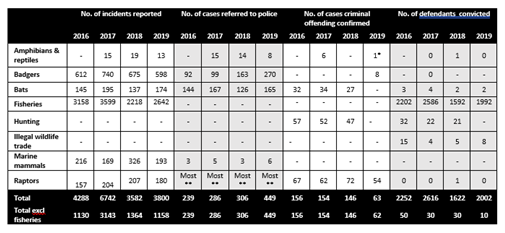6 November 2020
Wildlife and Countryside Link and Wales Environment Link’s latest report on wildlife crime across England and Wales reveals positive progress in identifying and tackling hi-tech online criminals who are harming our wildlife.[1] Yet centuries old hunting, trapping, and poisoning practices, and smuggling of illegal wildlife goods, are still widespread, and exacting a heavy penalty for nature, warn conservation experts.
Activity on wildlife cybercrime (which can include illegal hunting and trapping coordination, gambling on live-stream cruelty such as badger and dog fights, and the online sale of rare protected species) has ramped up over the last year. Online initiatives from police and wildlife organisations have led to more tips from the public, arrests, and rescues of animals - such as dogs injured in badger-baiting. The creation of a new Cyber Enabled Wildlife Crime Priority Delivery Group, led by the police National Wildlife Crime Unit, has been hailed by conservationists as a major step forward in improving prevention, intelligence and enforcement.
Yet many wildlife crimes continue to be unwitnessed or unreported and go unpunished. A shocking array of wildlife including bats, birds, badgers, plants, hares, deer, fish, seals, dolphins, amphibians and reptiles, and more, are harmed at the hands of hunters, poachers, criminals, and even normally law-abiding members of the public every year. [2] Overall levels of reported wildlife crimes have changed very little in the four years since our annual report was first published, with 3800 incidents reported in 2019 compared to 4288 in 2016.
Convictions remain shockingly low, with just 10 people convicted of wildlife crimes in 2019 (other than convictions relating to fisheries crimes).
Dr Richard Benwell CEO of Wildlife and Countryside Link said: ‘The wildlife crime underworld in Britain remains rampant. Our figures are just a snapshot of the number of animals being illegally hurt and killed every single day, sometimes for sport, sometimes for profit, sometimes in sheer callousness. Steps forward in tackling the growing online world of wildlife crime are very welcome. But overall a lack of adequate police recording and resourcing, low levels of prosecutions and inadequate sentencing are leaving our wildlife without the protection it needs.’
Martin Sims of the League Against Cruel Sports and Chair of Link’s Wildlife Crime Working Group, said: ‘It seems incredible in our digital age that our police forces can’t just call up the data they need to effectively tackle wildlife crime at the touch of a button. While the police are cracking down on wildlife cyber criminals more effectively now, their own electronic data on wildlife crimes is decades behind where it should be. We need to bring the fight against wildlife crime into the 21st century and ensure police have the resources they need to punish those who are harming our natural world.’
Paul De Ornellas, Chief Wildlife Adviser at WWF-UK said: “In recent years the UK has played a significant role in focusing global attention on the illegal wildlife trade. This report clearly shows that wildlife crime, including links to illicit wildlife trade internationally, is happening here at home, with a concerning increase in cybercrime and the use of major UK airports by traffickers. To continue to show global leadership, the government must do more to address IWT in its own backyard, as well as overseas”
Additional quotes from the RSPCA, the National Trust and Plantlife can be found here
The biggest barrier to tackling wildlife crime remains the lack of recording, reporting, and resourcing allocated to these crimes by the police and Home Office. Wildlife cybercrime is believed to be extensive, but, as with many types of wildlife crime, it is not recorded in any meaningful way, due in large part to the absence of dedicated police wildlife crime reporting codes. So it is impossible to assess patterns and levels of wildlife crimes accurately and effectively target resources. There is a National Wildlife Crime Unit within the police, but this has been significantly underfunded for years and is currently going through an opaque restructuring process.
While fisheries crimes continue to receive low sentencing (and are a target for organised crime for this reason), the data, prosecution and conviction rates for fisheries crimes are notably better than for other types of wildlife crime. The main reason for this is that these crimes are tackled by a well-resourced section of the Environment Agency (in England) and Natural Resources Wales, funded by fishing licence fees. The fact that in 2019 2642 fisheries crimes were reported (more than double the number of all types of wildlife crime we report on combined) and 1992 people were convicted (compared to just 10 for other crimes) puts into stark relief the difference that adequate resourcing can make.
To help ensure that wildlife across England and Wales are adequately protected, conservation groups are calling on the Home Office and the Police to:




Latest Press Releases